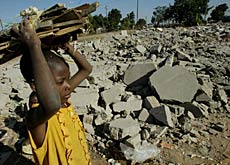
Demolitions in Zimbabwe hamper Swiss aid work

Swiss aid agencies say Zimbabwe’s controversial slum-clearance programme has severely affected their work in the African country.
On Thursday Harare said that the demolitions, which razed several townships to the ground, had come to an end. But the United Nations estimates that the operation has left about 700,000 people without homes.
The Swiss Agency for Development and Cooperation (SDC) has channelled emergency cash reserves into Zimbabwe to help people affected by the clearances.
The agency has already poured SFr1.39 million ($1.07 million) into the country so far this year, roughly the same amount as was spent on Zimbabwe for the whole of 2004, with SFr680,000 earmarked for food and milk distribution.
“Zimbabwe is in a vicious circle of structural and social collapse, made worse by the town clearances,” SDC spokesman Jean-Philippe Jutzi told swissinfo.
“The main problem we face is corruption. We have to be vigilant to make sure this money reaches the intended areas.”
Setback
Swiss charity Heks has been working in Zimbabwe since before the country’s independence in 1980. It said that its programmes had suffered a huge setback as a result of the government’s policy.
Spokeswoman Barbara Müller told swissinfo that the worst affected project was a workshop that had been in operation for eight years in the township of Chitungwiza, providing training in carpentry and needlework to enable local people to earn a living.
“The premises have been completely demolished and much of the equipment has also been lost,” said Müller.
“Former trainees have also had their workshops destroyed, taking away their ability to make a living for themselves.”
Work goes on
Müller added that the extent of the damage was not yet clear, but confirmed that several staff members had lost their homes.
“We must find out how we can get together and continue our work under the changed circumstances. The people who have lost everything… are resilient and will carry on despite this setback.”
The Zimbabwean government has defended the slum-clearance campaign, arguing that it was a means of reducing crime.
It has also pledged to build new homes for those who have been uprooted.
Donation and protest
In a related development, the Geneva-based World Council of Churches has donated SFr500,000 in aid and issued a protest to Zimbabwe’s government.
It said the clearances of slums had been carried out “at a time when the rural areas are particularly unable to absorb those expelled from the urban areas because of the effects of drought”.
The protest comes in the same week that the UN Security Council discussed a report on the demolition of the slums.
The report, compiled by UN special envoy Anna Tibaijuka, said the campaign violated international law.
UN Secretary-General Kofi Annan has described the clearance programme as a “catastrophic injustice to Zimbabwe’s poorest citizens”.
swissinfo, Matthew Allen
The UN estimates that 700,000 people have been made homeless and around 2.4 million have been affected by Zimbabwe’s slum-clearance programme.
The Swiss Agency for Development and Cooperation has invested SFr1.39 million in aid to Zimbabwe since the beginning of the year.
The Zimbabwe government’s “Operation Drive Out Trash” started in May and lasted until the end of July.

In compliance with the JTI standards
More: SWI swissinfo.ch certified by the Journalism Trust Initiative





























You can find an overview of ongoing debates with our journalists here . Please join us!
If you want to start a conversation about a topic raised in this article or want to report factual errors, email us at english@swissinfo.ch.